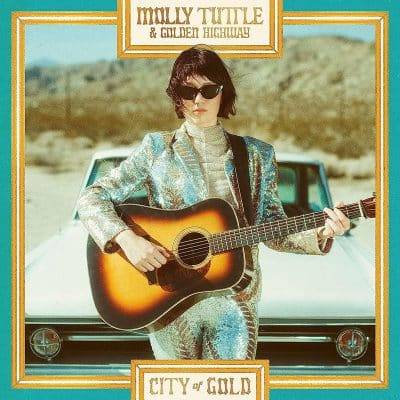Molly Tuttle & Golden Highway City of Gold
 Molly Tuttle & Golden Highway
Molly Tuttle & Golden Highway
City of Gold
Nonesuch
Play the last song of this dazzling bluegrass adventure first. Throughout “The First Time I Fell in Love,” a lilting “Mr. Bojangles”-like melody carries Molly Tuttle’s soul baring recollections of being a teenager. Tuttle was diagnosed with Alopecia as a three-year-old, and it quickly advanced to total body hair loss. How that affected a young girl growing up in California in the 1990s can only be imagined. But Tuttle’s focus avoids the “leers,” “tears,” or “fears,” zeroing in on the happiness she cherished growing up. That joy included becoming an expert guitarist by age eleven. The song’s message, to love oneself no matter, has the potential to make a real difference in this “topsy turvy” day and age. Otherwise, the tune is simply gorgeous.
Molly Tuttle has been riding a huge, deserved wave not just because of her incredible guitar chops, but also by her songwriting and interpretive skills, her beautiful singing voice, and her band’s relentless touring and natural but daring stage presence bursting with shenanigans. And of course, Tuttle’s Best Bluegrass Album Grammy Award for her previous solo record, Crooked Tree.
City of Gold features Tuttle leading her touring band Golden Highway—Bronwyn Keith-Hynes on fiddle and harmony singing, Dominick Leslie on mandolin, Kyle Tuttle (no relation) on banjo and harmony, and Shelby Means on bass and harmony—for the first time on record. Cut live in the studio by dobro legend Jerry Douglas (he plays on three of the tracks), the quintet lights fire after fire under an engaging and diverse—musically and thematically—set of songs, all composed by Tuttle and Old Crow Medicine Show’s Ketch Secor.
They kick the album into high gear with “El Dorado,” cooking up a spicy mix of Southwestern country-flavored bluegrass. Tuttle sings the mini epic about the madness of the California Gold Rush energetically, but with angelic pitch and pure soul. The synergy shared by the virtuoso players results in magical roots music, commanding of attention without ever being overbearing. Even in “Where Did All the Wild Things Go,” in which Tuttle and the band demand a party in howling voice and with aggressive string bending. Tuttle later reinforces her love of “greens” in the hilarious hoedown, “Down Home Dispensary,” guitar and banjo notes twisting together in potent style. The stately “When My Race is Run” summons thoughts of Dolly Parton and Dylan’s “I Shall Be Released,” but the adventuresome “Alice in the Bluegrass,” which stretches the Alice in Wonderland story quite uniquely, goes somewhere else entirely.
Peals from Keith-Hynes’s fiddle signals traditional bluegrass at the outset of “Yosemite,” Tuttle’s beautiful lament about a broken marriage, the splendor in her voice standing out even more so by the dusty duet singing of guest star Dave Matthews.
The many paths taken throughout City of Gold offer contrasting highlights, each boding more than well for not only the future of bluegrass, but country, and American roots music in general. Molly Tuttle and Golden Highway have achieved greatness here, and they are just getting their engines revved.
Tom Clarke for MAS
Buy Us a Cup of Coffee!
Join the movement in supporting Making a Scene, the premier independent resource for both emerging musicians and the dedicated fans who champion them.
We showcase this vibrant community that celebrates the raw talent and creative spirit driving the music industry forward. From insightful articles and in-depth interviews to exclusive content and insider tips, Making a Scene empowers artists to thrive and fans to discover their next favorite sound.
Together, let’s amplify the voices of independent musicians and forge unforgettable connections through the power of music
Make a one-time donation
Make a monthly donation
Make a yearly donation
Buy us a cup of Coffee!
Or enter a custom amount
Your contribution is appreciated.
Your contribution is appreciated.
Your contribution is appreciated.
DonateDonate monthlyDonate yearlyYou can donate directly through Paypal!
Subscribe to Our Newsletter
Discover more from Making A Scene!
Subscribe to get the latest posts sent to your email.













































